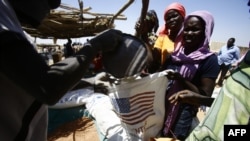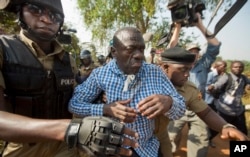Few spots on the globe are as troubled as East Africa, where South Sudan is struggling with conflict and famine, Burundi remains stuck in political crisis and Somalia and Kenya are trying to deal with a resurgent al-Shabab. Analysts say ethnic mistrust and weak governments are undermining the regional response to crises.
Five years ago, East Africa appeared to be on the dawn of a peaceful age. After years of regional intervention, South Sudan had become independent, al-Shabab was retreating in Somalia and Burundi's long civil war was over.
But today, all three countries are back in crisis. The worst situation is in South Sudan, where a three-year civil war combined with drought has dragged parts of the country into famine.
Ambassador Ochieng Adala is the former head of Africa Peace Forum and Kenyan U.N. ambassador, who has been involved in South Sudan talks since the late 1990s.
He said regional leaders failed to follow up on the 2005 agreement that paved the way for South Sudan's independence.
“When South Sudan Comprehensive Peace Agreement was negotiated, we lacked the follow up mechanism. The negotiators did not put in place mechanisms to follow up and make sure that the comprehensive peace agreement was adhered to and there would be sanctions or there will be punishment for people who violated peace agreement,” he said.
Adala said negotiators and peacemakers have failed to address ethnic conflicts when trying to resolve disputes in South Sudan and across East Africa.
“You see tribal element in there [the conflicts in Africa]. How do you help another country solve its own tribal conflicts when you have the same tribal conflict? The tendency would be try and bury your head under the sand, do not over play the tribal card and hope things will solve itself,” said Adala.
Political analyst Emmanuel Kisiangani said a lack of democracy and good governance limits the region's ability to address the political disputes.
“I think that’s the challenge we have had in the region. If you look at Uganda accusations of rigging elections, if its Ethiopia I do not think that is a good example when it comes to promoting democracy, Kenya has its own issues," said Kisiangani.
Freedom House, a organization that promotes human rights and democracy, ranked nearly every country in East Africa as "not free" in its most recent report. Only Kenya and Tanzania escaped that label, being judged as "partly free."
Some observers say the regional bloc IGAD cannot solve the current conflicts alone, and will need greater help from the African Union and United Nations to resolve of the region's crises.





